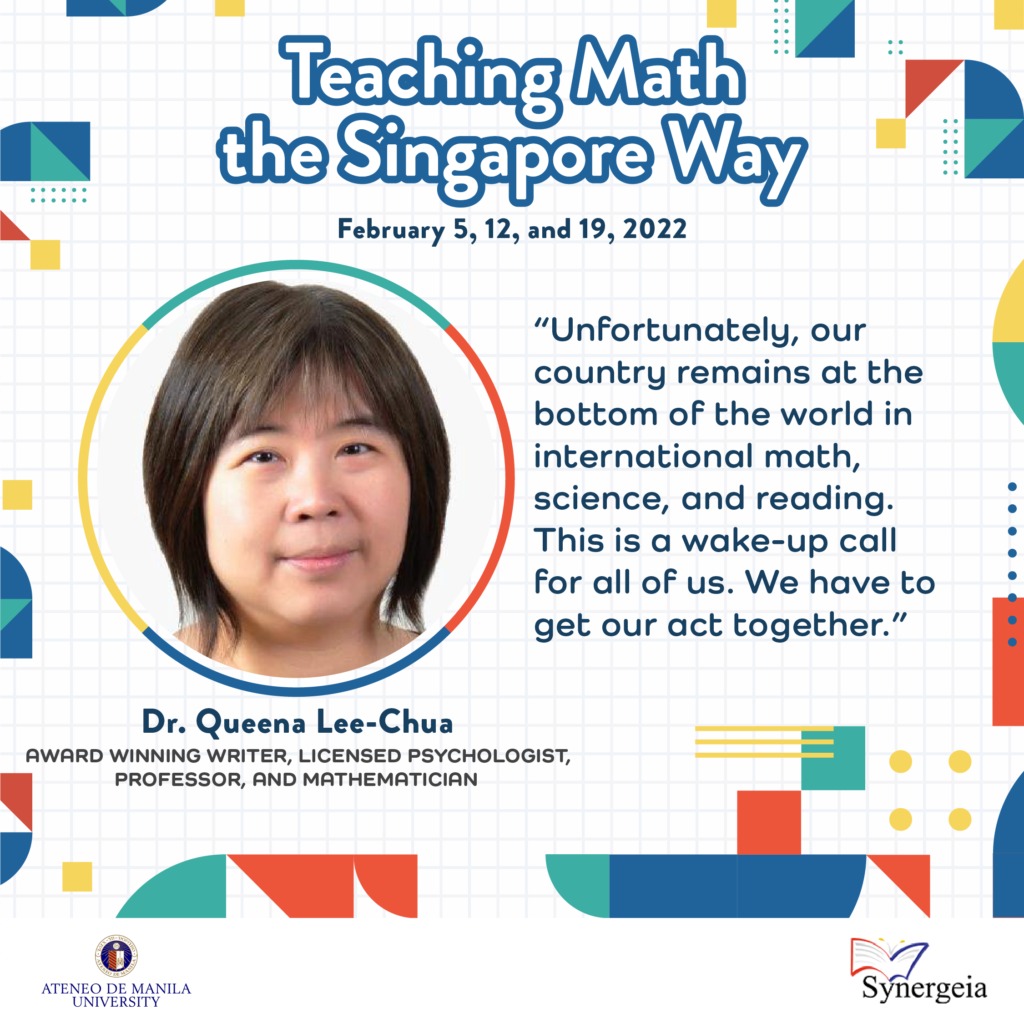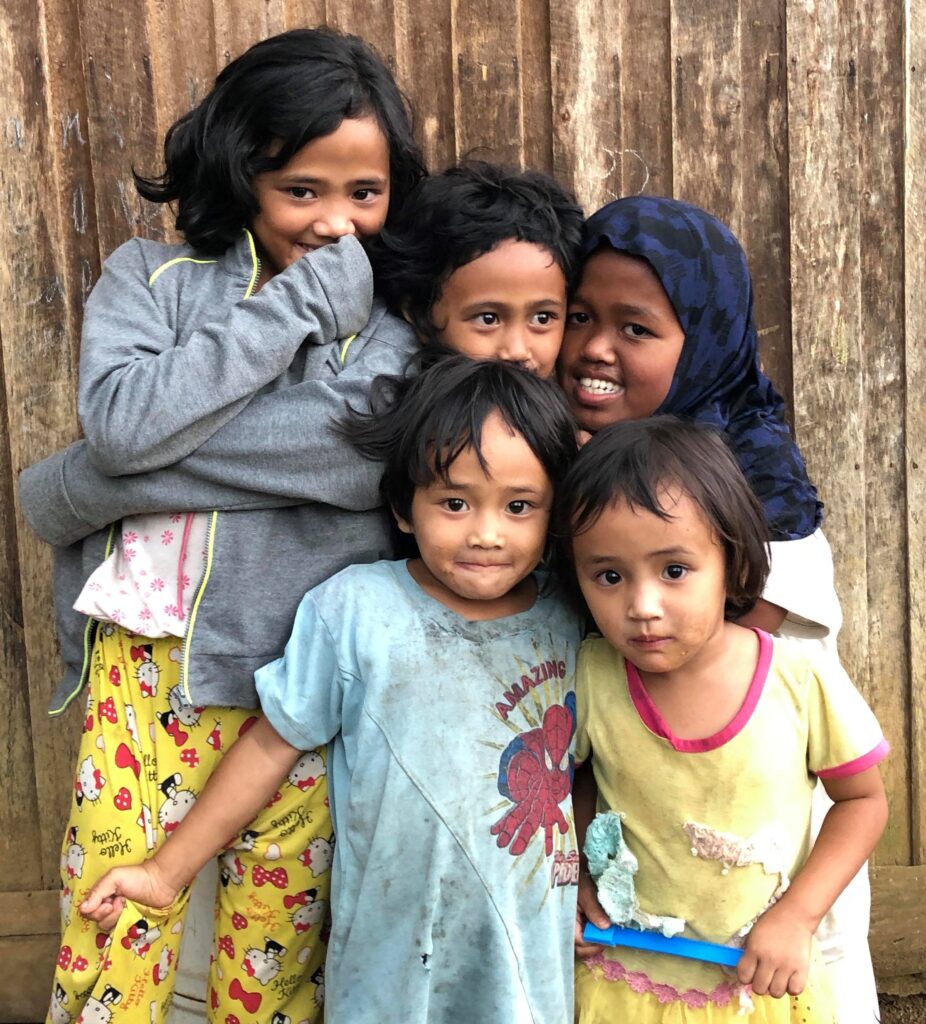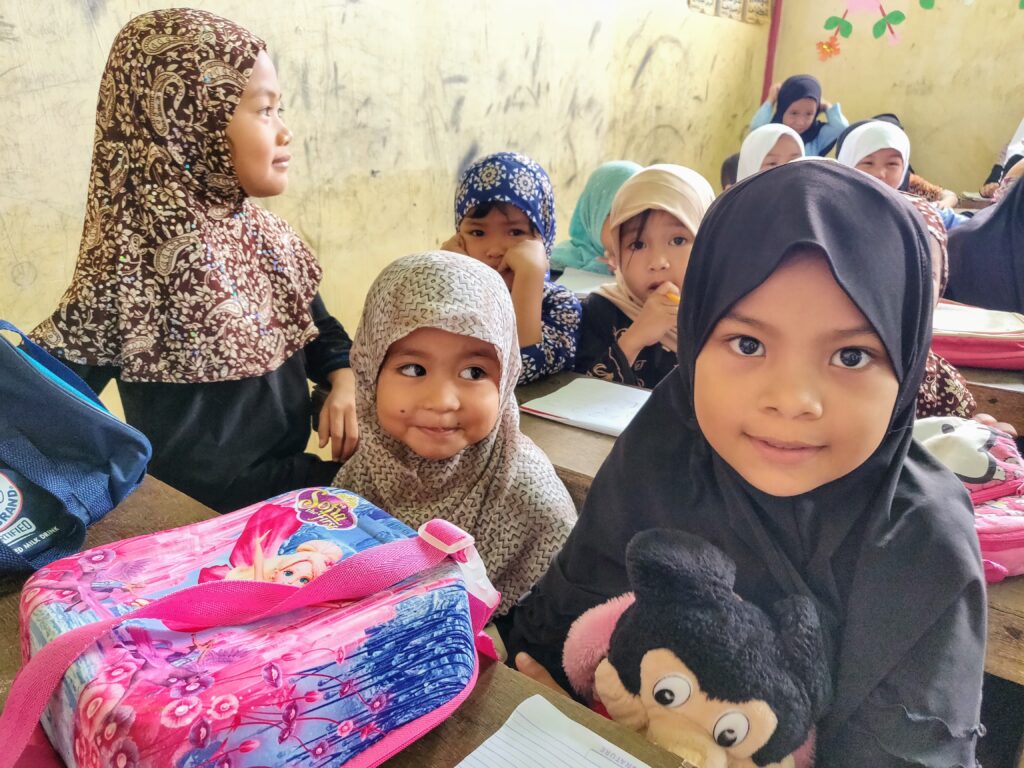
“Teaching Math the Singapore Way: A Training for Teachers and Tutors”
On the state of Mathematics in the Philippines
By Queena N. Lee-Chua, PhD
Licensed psychologist, columnist, professor, and mathematician
February 5, 12, and 19, 2022
Synergeia Foundation
Slowly, we will make students learn Math better. They need to learn Math better because, when they grow up, they are the future of our nation. We have to do this for the sake of our country. That’s it.
I am handling many Math classes. I teach in Ateneo. I volunteer. I am also handling a Math class at Far Eastern University. And this is part of what I show my students. I think this is why Ningning invited me. This is why my son and I decided to do this to help the Philippines. You can Google everything that I say.
I will start with a bit of bad news. Unfortunately, our poor country remains at the bottom of the world in international Math, Science, and Reading. This is a wakeup call for all of us. We will have to get our act together. Tayo lang ang bansa na hindi magaling sa Math. We find it funny and, minsan, ipinagmamalaki pa natin. That’s a very bad attitude, kasi kung ganyan tayo, we will not progress. Kaya nga, yung ibang bansa, they are making a lot of progress.
We are trying with the help of NGOs, like Synergeia. Our LGUs are trying their best. But our culture is a culture that feels that learning is difficult. Gusto natin, ma-entertain tayo. Gusto natin, palaging madali. Gusto natin, instant gratification. Mahirap yan sa Mathematics. Sa Mathematics, ang kailangan, tiyaga. Kailangan ng effort, kailangan upuan natin. Kaya nga, three hours in three days. Hindi namin kayang bilisan ito. We need you to really understand.
I will show you the international surveys. This is PISA. PISA is the program for international science, an international assessment. In 2018, we participated in this one. Reading, Math, and Science. Countries are ranked in descending order. The highest are several cities in China. Singapore is there (that’s why we are doing Singapore Math), Macao, Hong Kong, Estonia is doing very well, Canada, and Finland. Magaling din yan. Many of you know the Nordic countries, magagaling yan. United States, medyo nasa gitna. Japan, Australia, Taipei.
Nasaan tayo? Baba pa. Ito ang nakakaiyak noong nakita ko. Philippines: ang pinakamababa. Philippines in Mathematics—we are second from the bottom. Dominican Republic is lower than we are. In science, we are also second from the bottom. Dito kayo magugulat. Akala natin, mas magaling tayo sa Ingles, di ba? Pero in English, we are at the bottom. Math and Science–we are second from the bottom. Mas mataas pa ang Math and Science natin kaysa Ingles. Nakakagulat di ba? I am not surprised. In Ateneo, usually the ones who are doing well in Math are also doing well in English. So it is not true na kung inglesera ka or nasa arts ka, hindi ka magaling sa Math. Hindi yan tutoo.
Math is a language. English is also a language. Filipino is also a language. So how do we learn English? How do we learn Filipino? Natututo tayo kasi bata pa tayo, we talk to our parents in Pilipino. Kayo sa Northern Luzon, you also know Ilocano. We learn language by practice. So, sa Mathematics, ganoon din. We learn Mathematics by practice. Problema kasi sa atin, yung mga kababayan natin, takot tayo sa Math. At kung takot tayo sa Math, ayaw nating i-practice. Kung hindi natin i-practice, we will never become better. That is the key. Kung ayaw natin, ina-avoid natin. That shouldn’t be. Kaya kawawa tayo. Sa buong mundo, tayo ang pinakamababa. Can you imagine that? Mas mababa pa tayo sa Kosovo. May civil war diyan. Morocco. Lebanon. They are poorer than we are. Palagi nating sinasabi na kasi mahirap tayo. But poverty should not be a hindrance.
I am very inspired by what Synergeia does. I am very inspired by what you do. Nakita ko mga two-way radios na pinakita ni Fr. Ben. Yung sa GK Northern Luzon. He told me that many of these children, mga guro na walang Wi-Fi nakita ko sa video nila, nag-aaral sila ng Math and Science through two-way radio. Napaiyak ako sa galak. Sabi ko, ang galing! There are so many people who want to learn. Kasama kayo doon, dear teachers. Sabado ngayon. Mas madaling matulog. Sabi ko pagod na pagod ako. May klase ako hanggang kagabi. Pero mahal ko ang bansa natin. Ayokong makita ang Pilipinas na kulelat. Dapat naman may dignity tayo and hindi lang for international purposes. Mathematics and Science run the modern world. Zoom is made possible because of Math and Science.
Because our country is not good in Math and Science, we are also not economically good and we cannot think logically. We cannot think rationally. Yan ang importante sa math. Kaya we are also not solving the pandemic problem well. But we are trying our best. Malaki ang puso natin. Yun ang maganda sa Pinoy. We are very understanding. We are very compassionate. We help each other. Malaki ang puso natin and that is something I am very thankful for. Synergeia itself has a very big heart. What Ningning does. What Dr. Nene does. Fr. Ben told me about it. I have attended their sessions. What your LGU does. Ang galing. You are very good leaders. You are people who care.
But this is what you have to add and I have to say this because I have been teaching for more than 30 years. I started teaching at the age of 20 in Ateneo. Mga estudyante ko were one or two years younger than me. In 1987, when I graduated, deretso ako sa pagtuturo. So wala tayong problema sa puso. Marami ang gustong magturo. Yun ang maganda. Marami din ang ayaw. Wala ako pakialam sa ayaw magturo. Let’s not be distracted. I am quoting Fr. Ben. Let’s not be distracted by other people who don’t know what’s right. We want to focus on people who are working, helping.
I need to say this. A big heart is not enough. Okay na malaki ang puso natin. We should have big hearts. Wala tayong maa-acomplish if our minds are not as big as our hearts. If we want to help, but don’t know how to do it—wala! So many people say we want to help people in Math. I also help in “Teach for the Philippines.” I volunteered with “Teach for the Philippines” before the pandemic. I taught Singapore Math to Grade 6 public school students. Ang gagaling ng mga bata. Isang oras, lang pero marami kaming nagawa sa isang oras. So, tuwang tuwa ako. Sanay akong magturo sa mga mahihirap. Wala akong paki kung mahirap sila. Gusto nilang matuto. Poverty is not a reason for us not to do well.
Many of the countries doing better than us – Kazakhstan, Baku, North Macedonia—are poorer than we are, yet they are handling the pandemic better than we do. Why? Because they use their reasoning skills. They use rationality. Importante yan. Yung mathematics kasi, hindi natin puwedeng bolahin. Eh, Pinoy tayo, mahilig tayong mambola. Magsalita lang tayo, iiyak lang tayo, akala natin okay na. Or we pull strings—ok si ganito, kilala ko si ganito. But that is not the way life is. Hindi puwedeng ganyan sa pandemia. We have to know the science we have to know which vaccines work. We have to do mathematical modeling. And many of my colleagues in Ateneo are helping the government predict, like what will happen in this scenario. And that requires mathematics. Hindi puwede ang puso lang. Our head should be as big as our hearts.
I will end with this other international survey. The one who alerted me to this is Fr Ben Nebres. He has been working all his life to make our country better. TIMSS is a survey on international Math and Science. In 2019, we took a test for Grade 4 and another for Grade 8. Mga guro, yung test ng Grade 4, addition, subtraction, multiplication, division saka madaling fractions. Pero hindi din maganda ang mga resulta natin. Sino ang matataas? East Asian countries are top achievers in Mathematics by a substantial margin. Ang matataas uli: Singapore, No. 1. Hong Kong. Korea. Chinese Taipei. Japan. Russia. Ireland. England. Latvia, etc. Nasaan tayo? Hindi lang tayo second to the bottom. Nasa bottom tayo. Tayo lang ang bansa na hindi naka 300. Hindi kaya ng mga bata natin na mag add, subtract, multiply and divide. That’s what it means. They cannot really do problem solving. That’s for Mathematics. Now for Science. Eto yung mga matataas, pareho din. Tayo din ang pinakamababa.
We are a country that thinks being bad in Math is okay. Ipinagmamalaki pa natin. Takot ako sa Math! Hindi tayo nahihiya sa sarili natin. Kaya ganito ang nangyayari. Alam ko deretso akong magsalita kasi kailangan kong magsabi ng tutoo. Life is too short for me to lie to you. I am very happy to be here today because, slowly, we will make our students learn Math better. And they need to learn Math better because, when they grow up, they are the future of our nation. This is not for them to become honor students. This has nothing to do with it. We have to do this for the sake of our country. That’s it. That’s why we are here. It’s imperative. This is no longer a luxury. In the 21st century, all technology is based on Mathematics and Science. It is a need, a requirement. Hindi ito para sa matatalino lang. There’s no such thing as matatalino. No one is born matalino. Yung mga matatalino sa Math sila rin ang pinakamasipag, ang pinakamadisiplina.





